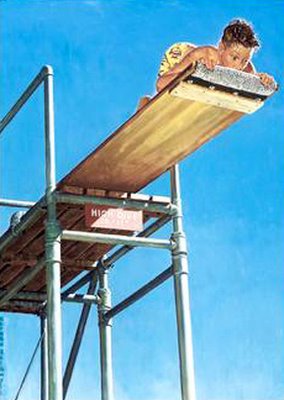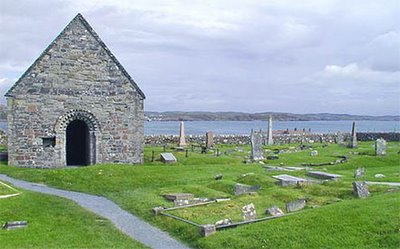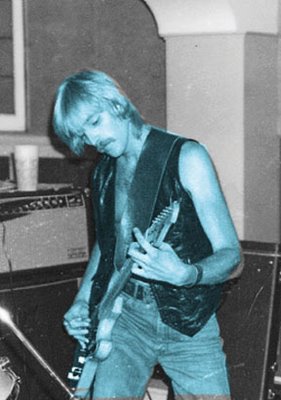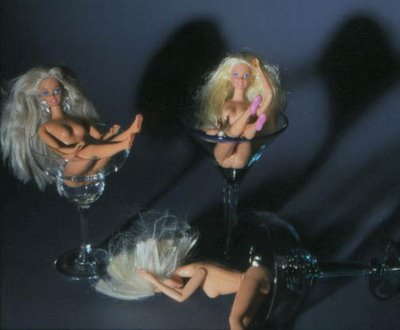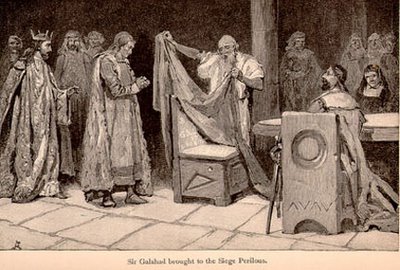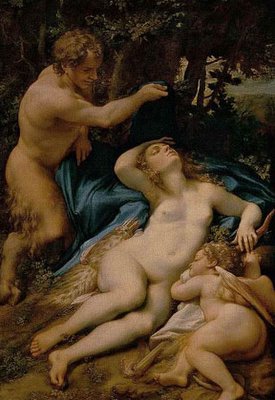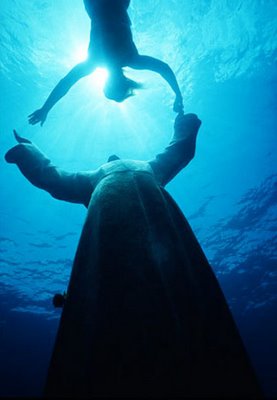
O God! that man should be a thing for immortal souls to sieve through!
-- Ahab,
Moby Dick, 567
***
Must we soak in the brine before our bones calyx the sea’s deepest music? Here it’s late Sunday afternoon in light-ebbing suburbia, middle-aged ex-football players hooting for the Jags a couple of doors down, my wife vacuuming upstairs, Violet in the window soaking up the satch of early evening, her eyes bluer than the darkest cyans arousing from dusk. I’m here, quintessentially, while the ravelling goes on below, my mentors all drowned to time, my love lost on the marge where an incessant surf sings of God ...
***
DEEP-SEA COMPASSMay 2005
A compass soaked in deep-sea salt
bournes a ghoulie orient, the world
it tongues abyssal, wild, and strange,
drawing my north-borne eyes to
points way south, to fix as home’s
most golden port a pass of high-
blown awfulness, its blue what
angels howl from heavens
farthest down. That compass
steers this hand over the page
along a gradient of wind and
wave pitched to awe’s infernity,
its line of sight that lime-spread
road of revenance and spleen
where my evil twin’s every
bad night bouree has been
plowed over by now sober
years of sitting in this daily
chair singing on to more
revenant and greater bones.
Look: The year now turns to
early summer when days are
hottest of them all, May
in Central Florida a soaring
spear of sun-drenched hours
which nails an eros to its heart,
greedy in thirst and winging
far to drink days to the dregs
in soaring amplitude. The manic
monkey here is born of that
hot pulse, plunging his nib
across pages pale as
my beloved’s ass;
every drop of ink he flings
is in measure to the milk
she never poured for me
but may yet -- or so he hopes
and thus writes down the liquid
pealings of high suck, draught
for draught of creamy blue.
A deep-sea compass points
me ever and most here
though I see no Cape
inside the coming day, not
with eyes set on the world’s
suburban panoply. I don’t
even know who I’m singing to anymore,
nor can say what agency
employs my voice this structure
hour. My job -- as best as I surmise
in the finny way of escaping
dreams -- my job is just to
ferry this strange instrument
to shores I’ll always hear the
sound of but never reach,
and in such failure pass its
salty freightage on, harrowed
by my attempt just enough
to make it gleam still worse.
Your compass is that tuba in
the angel troop that honks
in whalish brogue, one of
the deeper bassos in the choir
that human ears can heard,
though baser ones resound
in my wife’s sleepy first kiss.
Someone’s got to hold the low
end down. Your compass in
my throat sails me ever
toward those deep blue waters’
wounding wildest sound.
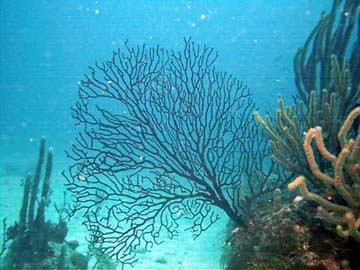
The Papago say that the vision only comes to ones who are worthy. “Only to the humble does the dream come, and contained in the dream, there is always the song.
Each subsequent singing becomes a reenactment of that powerful transforming event ... From the field of primary inspiration, he or she “sings into life” those who are plagued with those who are facing death. ...
... The song word is powerful; it names a thing, it stands at the sacred center, drawing all toward it. The word exists and does not exist. I both awakens an image and is an awakened image. The word disappears, the poetry is gone, but the imaginal form persists within the mind and works on the soul. Poesis, then, is an action and an interaction in its primary sense, is the process it creates.
-- Joan Halifax,
Shamanic Voices: A Survey of Visionary Narratives, 1979

In Chapter 93 of
Moby Dick, Pip, the young black steward of The Pequod, lands in one of the whale-boats when one of its regular hands is injured, and, as the chase is engaged, is hauled from the boat when the whale-line snaps against the chest. The line is cut, freeing the whale, and Pip is rescued with a stern warning from Stubb not to let that happen again. The narrative here picks up:
***
But we are all in the hands of the Gods; and Pip jumped again. It was under very similar circumstances to the first performance; but this time he did not breast out the line; and hence, when the whale started to run, Pip was left behind on the sea, like a hurried traveller's trunk. Alas! Stubb was but too true to his word. It was a beautiful, bounteous, blue day! the spangled sea calm and cool, and flatly stretching away, all round, to the horizon, like gold-beater's skin hammered out to the extremest. Bobbing up and down in that sea, Pip's ebon head showed like a head of cloves. No boat-knife was lifted when he fell so rapidly astern. Stubb's inexorable back was turned upon him; and the whale was winged. In three minutes, a whole mile of shoreless ocean was between Pip and Stubb. Out from the centre of the sea, poor Pip turned his crisp, curling, black head to the sun, another lonely castaway, though the loftiest and the brightest.
Now, in calm weather, to swim in the open ocean is as easy to the practised swimmer as to ride in a spring-carriage ashore. But the awful lonesomeness is intolerable. The intense concentration of self in the middle of such a heartless immensity, my God! who can tell it? Mark, how when sailors in a dead calm bathe in the open sea- mark how closely they hug their ship and only coast along her sides.
But had Stubb really abandoned the poor little negro to his fate? No; he did not mean to, at least. Because there were two boats in his wake, and he supposed, no doubt, that they would of course come up to Pip very quickly, and pick him up; though, indeed, such considerations towards oarsmen jeopardized through their own timidity, is not always manifested by the hunters in all similar instances; and such instances not unfrequently occur; almost invariably in the fishery, a coward, so called, is marked with the same ruthless detestation peculiar to military navies and armies.
But it so happened, that those boats, without seeing Pip, suddenly spying whales close to them on one side, turned, and gave chase; and Stubb's boat was now so far away, and he and all his crew so intent upon his fish, that Pip's ringed horizon began to expand around him miserably. By the merest chance the ship itself at last rescued him; but from that hour the little negro went about the deck an idiot; such, at least, they said he was. The sea had leeringly kept his finite body up, but drowned the infinite of his soul. Not drowned entirely, though. Rather carried down alive to wondrous depths, where strange shapes of the unwarped primal world glided to and fro before his passive eyes; and the miser-merman, Wisdom, revealed his hoarded heaps; and among the joyous, heartless, ever-juvenile eternities, Pip saw the multitudinous, God-omnipresent, coral insects, that out of the firmament of waters heaved the colossal orbs. He saw God's foot upon the treadle of the loom, and spoke it; and therefore his shipmates called him mad. So man's insanity is heaven's sense; and wandering from all mortal reason, man comes at last to that celestial thought, which, to reason, is absurd and frantic; and weal or woe, feels then uncompromised, indifferent as his God.
***
Ergo the maddening soak ...Pip never recovers from his madness, though it is instructive to Ahab, who takes the poor boy, once recovered, under his wing. He says to Pip, “There is that in thee, poor lad, which I feel to curing to my malady. Like cures like; and for this hunt, my malady becomes my most desired health.”

Shamanic initiation proper includes not only an ecstatic experience but ... a course in theoretical and practical instruction too complicated to be within the grasp of a neurotic. Whether they still are or are not subject to real attacks of epilepsy or hysteria, shamans, sorcerors, and medicine men in general cannot be regarded as merely sick; their psychopathic experience has a theoretical content. For if they have cured themselves and are able to cure others, it is, among other things, because they know the mechanisms, or rather, the
theory of illness.
-- Eliade,
Shamanism: Archaic Techniques of Ecstasy, 31
THE DEEP END
OF THE POOLNov. 24, 2005
I.
Dear dark father far down under every
shape of the one I’ve known, I write to you
now in a letter that began when I was
delved up to the world on a wave of
bawling song: That water eddied and
swole slowly through my childhood,
cresting to a wave of malefic oh-o-swoony
height when its sexual semblance waxed
in my cresting teens, baptising me in its
blue augment long before I literally
became a man, if You know what I mean,
or I get properly now what You spleen
in my dream. Between events and our
knowledge of them is all that gets diseased
and mauled down into their awful wake,
years of twisting down abyms in a sprawl
of futile bubbles, dying in every bright
way to the dark underside which demand
descent before revealing what all mantas
shade, that gospel which You bid me
read at last beyond the lowest floating
lines which yesterday I wrote, leaving
me here to start again. But it’s all the same
event, the wound and its womb I mean,
with all the years between just peramabling
bubbles of a dream which is the
real event,
its mundo, its shoving-off and every far
shore, the whole damn cathedral of
carouse at the bottom of God’s drowse.
Hell, what I see now might actually be
invoking its history, as if later reflection
could actually rouse percipient blue deeds.
Thus my ends beyond are just the oldest
rooms of a house I’ve yet to dig all full
down to, Trois-Freres that shore where
all I’ve sung matches Your voice enough
to join me amid the herd upon cave
walls, rescinding their plural deaths
in the resonance of my dust, sands
one day scattered on that one long beach
which crashes in my ear and in the shape
of every woman I loved too much to reach.
II.
Wing with me back to Chicago in the
Summer of 1974 to visit my last months
in that urban blight before taking leave
for good for college. Here is where my family
bone is broken the worst, the deep end
of that pool I call Intimacy which since
I’ve so loathed and bungled and yearned
the greatest depths of. You were spinning
fate’s wheels hard with all betters losing
worse: My father could no longer live inside
the closet of his life, and with an at-last
honest groan came out, telling my mother
me and my older brother that he was gay,
no husband of any ilk, nor much again
a father. Thus their marriage was finally
thrown in the drink and our family life
it once contained allowed to spout blood
and bloat and slowly turn over, giving up
the ghost which had darkened every
door we lived in with a closet’s gloom for
so many years. My mother, confirmed at
last of what she always knew, took my
younger brother and sister and moved south
for good to city- north- and husband-less
Orlando; my father, older brother and myself,
we lived as remnants for a while in that
now too-empty house on Fullerton
as summer cracked the Chicago in an
infernal runny roar. My father planned
to quit the church and move to New York
City’s; my brother was to move to California
where a new life might help him work
afar; and I was headed to Spokane for
school: So that last season in Chicago
was all for ending things but good, for
stumbling round the wounds like ghouls,
and pouring on the booze but good, our
thirst expanding exponentially
as Your dark mouth formed a deep end
to the hurt, a house at the bottom of
all things where bad spirits come to roar.
The echoes in that house those months
were hard and loud, each creak of a chair
around our emptied dining table sounding
in a percussive snap, beats of Your
shaman drum I guess. Scotch made
those noises mellow, even desirable,
as if the louder pain gave cause to amp
the imps of whiskey poured on ice,
one finger for divorce, two for silence
round the dinner table, three for the
sound of fast hooves away across a
frozen tundra of high emptiness. We drank
like fish that summer, my father no longer
caring much to be a father in the old way,
always there to talk and care but in no mood to warden
how much booze we drank, or sheriff
us for pouring every other octane on our
self-evicting flames. I frame that fire in Your
tinderbox dark Father, though the saying’s
hard, feral as all educations down under
I have learned must soddenly go.
Graduates of high school, family,
Christianity, and hope of saner
upper worlds, we became a drinker’s
mad fraternity, pouring booze on all that’s
spilled when faith’s been killed, when
what lives on in love’s hardest paternity.
III.
I spent some hot afternoons that summer
up on the roof of Ruth’s row house
across from our with she and her friend
Cathy, acting like soon-to-be-fully minted
adults, splayed half naked in folding chairs
beneath a turgid sun, listening to Pink Floyd
and the Doobie Brothers on rock radio &
talking about the glistening world through
a sheen of baby oil. Our desire was just
barely offshore of remittance, our good
Christianity losing the last of its embracure;
we bitched about our shitty lives and
dreamed of all we’d one day imbibe
once we figured out how to pop the cork
jammed hard in each of our young heads.
It was one of the season’s insanities, those
fleshy colloquies up high which could only
talk but never fly: a high-dive symposia
which taught that when you stand up
there long enough admiring the view,
the deep end of the pool just gets deeper and wilder and
more fierce, more quintessentially wild bllue.
We’d take turns reading from porno books
which Cathy had lifted from a brother’s stash, our voices quavering,
an infernal stillness in the air as we dared
to mouth words like
cock and
cunt in
so languid and labial a relish, tonguing
thrust and
heaving breasts, some region
of our brains parted to
spiralling orgasmand
ribbons of hot spurting come,
the three of us calm as toast upon those
folding chairs, the music tinny in its
upmost registers, while such deep bassos
roared between us, Cathy's big boobs in
in a blue bikini top bursting my every
seam, Ruth’s mouth a berry pucker saying
suck and
balls and
glans. It would be
a year before I dove into all that with
Ruth in splash of cerulean nitro; six months
later when, passing through Chicago in
deep winter, I plunged Cathy to the hilt
after a party in about the three seconds
it took to dive all the way at last from
that roof.
Maybe now you’ll write me, she said as I kissed her rumpled, fresh-
fucked visage at the door; I smiled and
walked forever out into the silence of her
life. That summer we just burnt our soulage
on the roof, tindering wings for later flight
when eventually and on our own we each
leapt off and flew down to our separate
histories. It was all just talk then, the
first departure from God’s higher word,
the bridge to every later ecstasy when
words became their labials. We talked
our ways off of that roof for sex, then
love, then family: But first we sang the songs,
as if by singing them at least and last
the deep end found us willing votives
when You ordained to break your Your fast.
IV.
One day I got a spider bite up near my groin
--or was that really You? The venom fanged
something which cause a riot in my flesh,
hives and bumps swelling left and right
until my groin was swelling fire. I grew
hysterical and then passed out -- perhaps
that feint my first big seizure -- coming up
from dark to fog, fumbling to the phone
to call my dad for help. Things were
indistinct a while and then I was on a
gurney in the emergency room, receiving
a shot of antihistimines. Dazed in that
freezing room of steel, I seemed only
halfway there, the other part lost in
a tundra space where merciless black horses
thundered north, their eyes so wild
with wind as to gaze on me forever there,
even as I recovered slowly from that bite.
I was welcomed back to consciousness
by a gaggle of interns and residents
led by a doc who lifted my hospital gown
to offer them all a peek at my strange
malady: they mmmmm’d as one to see
the tortured tundra round my cock. Ever
since I’ve never been much afraid of
insect bites, nor ever had another
reaction to spiders ants or wasps. Maybe
that was my only encounter yet with a bug of
true awfulness, or maybe I was simply
ripe and plucked for passage down to You,
my upper wounds like a mouth spread
wide for the host you venomed into me,
opening the way to wounds much further
down the darkest blues Fat City horned
in the hot streets of its summer.
IV.
The last month of that season before
I flew away was where, truly, I was
brined in Your pool’s deepest leagues.
We moved out of the house on Fullerton
into the church manse next to Wrigley Field,
a dirtier and more risky neighborhood
with Latin Eagles pounding tympanis
in the playground across the street
and poor white Appalachians growing
poorer up and down that sad old street.
But it was free and temporary, a good
springboard for taking our leave of the
city for good. Weekdays that August
I worked downtown in the basement of
a bank, processing checks amid a hive
of faceless clerks. The sums were vast
and tough to reconcile against the checks
that fled through my hands; the sums
were everywhere when I walked out at
dusk, gold blood painted on every downtown
dive, as if the setting sun was Hades’ coin.
(Someone else’s wealth amid our
destitution: another of the season’s
fell dichotomies.) Riding the El home
after work I watched the windows blur
on by, catching the eyes for just a flash of
some poor fuck worse off than I,
dressed in BVDs and weaving unsteadily
in a room forever far too close to the tracks.
His eyes bored into mine with every fraught
futurity I feared, but what else could I do
but drink? And so once home I happy
houred with my father and my brother,
our Scotches poured to nudge the rim,
the roars from Wrigley where the
Cubs were losing somehow approving
each hard pull which fell and fell
and fell inside. My father then was
between two augments, the church behind
him like some contemporary pagan age,
some older vision forming up ahead
where stones were bidding him to raise
old archetectures in new vision: But
that season there was only the blood
of what’s between, too clouded by
pain and fresh desire, so he drank
and hard. And my brother? Well, he was
all high-proof angst and lust, a party boy
who drove his days as if inside a burning
demo derby car, pinning foolish women
with strong hands that later came to heal
with an uncanny strength. But to get there
he too had far too much to drink. I’d
talk with them awhile getting three
Scotches down and then heading down
into the basement with three or four
beers in hand, setting them on an
Ampeg tubeless amp that was rounded
a hard glittery blue plastic plush.
I’d strap on a homemade guitar
that had given to me a year before
by the leader of hard-rocking Christian
band, when I was still devout and
white in Christ-like fealty. He gave
me the axe -- not much of one
except for the humbucker pickup
which really made the fucker squeal --
on the condition that I only play God’s
song’s, making me promise to burn
the ax if I ever wanted to play it
the devil’s way. Well, that was what I
thought to wing when You first
blew through me at fourteen; but
You obviously had other plans for me,
because by the summer I turned
seventeen I was riding wild the other
way, heading down in the profaner
song of playing loud and wild.
I’d pull on those beers and smoke my butts
and wail away on that guitar but loud,
no child or Christian or folk-guitarist
any more, winging out on boozy riffs
beyond all sight of home, to lands
I’d make a later haunted wreckage of
in the name of my slow education
in the ways of your hardest, deepest
songs. I drank and wailed upon that
cheap guitar until the song was spent
at that summer’s end, climbing on a
DC-10 to fly far west where You
you took my soul and taught it how
to break what cannot bend.
V.
Of that too-loud later immrama
I save for other songs: suffice to say
the music drowned me good before
it washed me on to here. Look: I’m still
here at 6 a.m. on Thanksgiving Day 2005,
31 years after that summer which You
perched above the amps of Hell,
sitting in the same white chair I’ve sat
in for years now every morning
before first light, doing what I always do
in the center of this life. I got to this
that older way --- so wrongly, hurtfully,
and wild -- but now I come to think that
every bruise’s bruiting was meant:
Every hangover, clap, sunburn,
split finger, hysteria, swoon, seizure, and
migraine writes the miniscule You
bid me cry aloud while the deeper
majescule went on instructing me
about darker bliss of what’s remiss
and fallen and oh-so-bottomless in
the deep end of the pool. Every woman
that I’ve pressed onto as if to drink
her sex to dregs has had the same
surficial sooth, like nipplage of darker
oceans which now learn to drink
without a single curve in sight. That I’m
writing you this letter only means
I get what was written there so long
ago, or perhaps only that I’ve glimpsed
the faintest title of the work I’ve left
to do. I feel I’ve nearly finished all that
I can say about that now: whatever journeys
forth seems zipped, like the woman falling
back into the wave with a finger of kelp
obscuring what her mouth would say.
The word “shaman” may be lost as
well, its port and purpose expendable,
a coin to toss the ferryman: We’ll see.
Suffice to say here, Father, that I now
thank You for dropping me in the deep
end that summer long ago. May I carry
down still further what you bid me find there
in the undertowing tones I come to sing.
